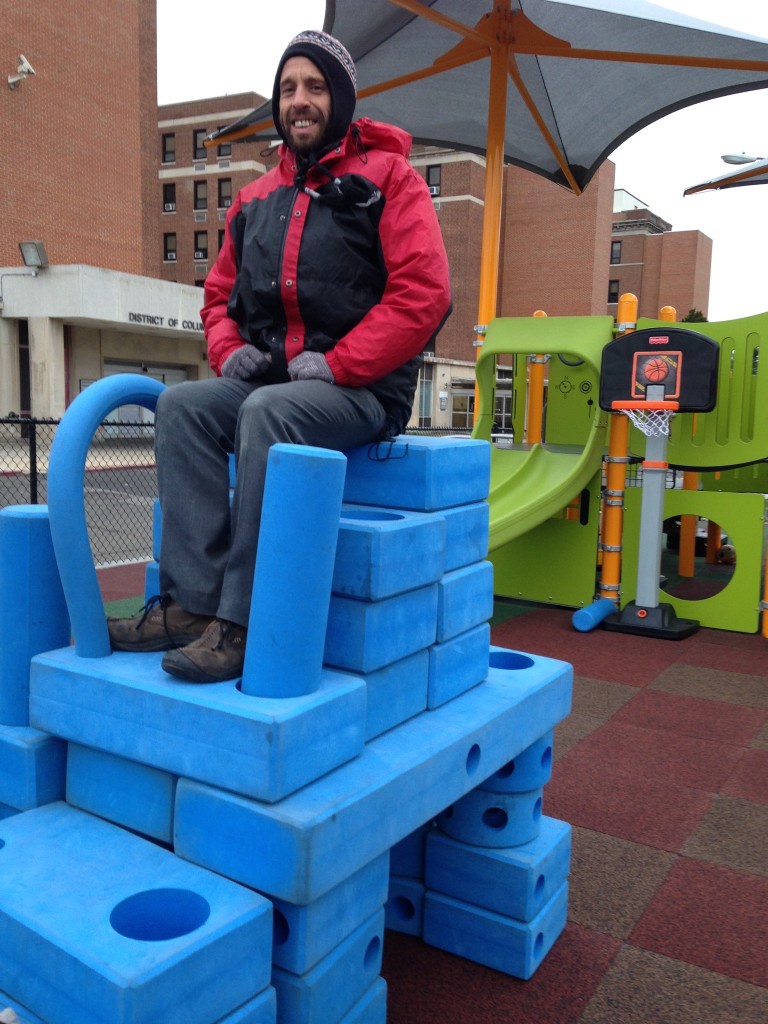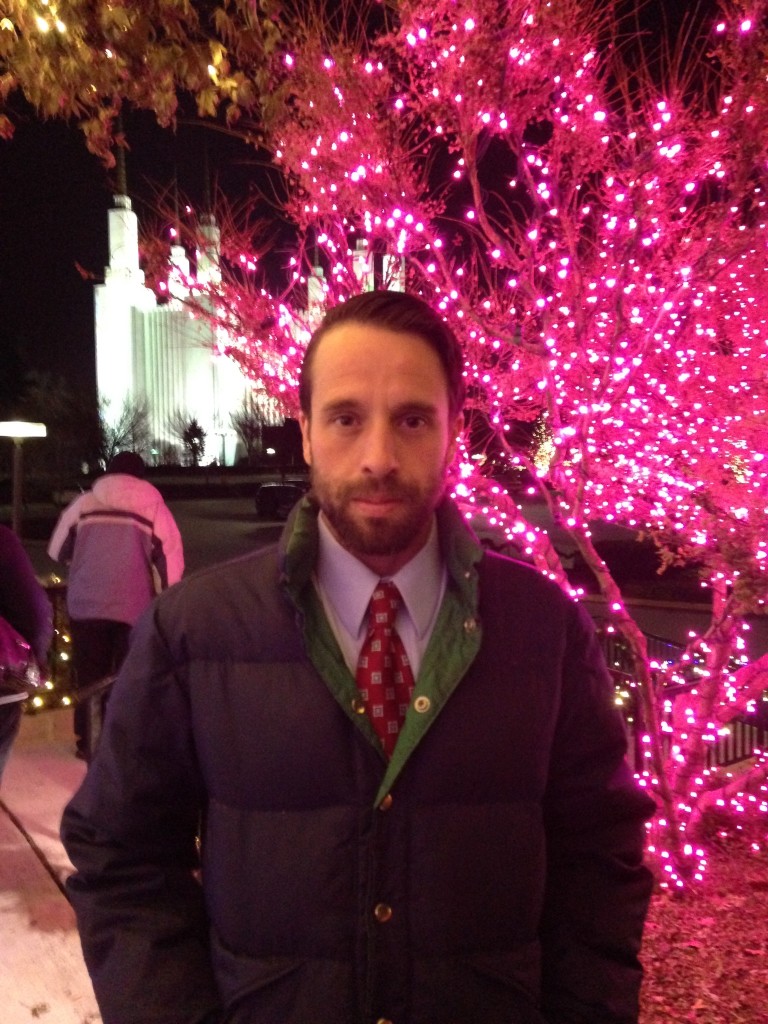When it fell to me recently to track down APU alumni and write up their stories for the website, Ron Sheffer (class of 1999) was one of the first people I wanted to talk to. Like several former students, we were Facebook friends, but I’m rarely on Facebook and so I wasn’t entirely sure what Ron was up to or even where he was. A quick message, however, put us back in touch.
One of the first questions I asked Ron was what he got out of his time at Alaska Pacific University. He began by reminding me that he had arrived on academic probation from another college he had been attending somewhere in the southern United States.
“At APU I learned how to be a college student and how to thrive in school,” he said. “The classes were cool. I learned to write, which you need for everything. And I was given the freedom I needed to use my talents in a self-directed way. I was allowed to take risks with my projects and with my education. APU gives students license to go after projects other schools would never let students do, and the faculty gave you feedback that was useful whether you succeeded or failed at a project. The teachers were great, and my classmates were great. The small size of the school gave me the chance to really get to know a diverse group of people. They were creative and talented people who are part of my personal and professional network today.”
I confess I did not think I would ever see the day when Ron Sheffer would use a phrase like “professional network.”
I met Ron on the first day of a basic communication requirement I taught. When I walked into the classroom, he was bouldering his way across a bank of windows and I paused in the doorway to watch. For the other students, this moved the spectacle to a whole new level – Now what?
Ron jumped down and, turning around, eyes squinting, took a moment to assess the scene at hand and my reaction before breaking into a wheezy snicker that revealed a broken front tooth. I took in the kid – dark, semi-matted shoulder-length hair and crazy layers of ripped, stained, clothing. Something out of “Mad Max: Beyond Thunderdome.” Positively feral.
“Um. Sorry,” Ron mumbled. He lowered his eyes and slid back to his seat, smiling to himself. He had sussed that I wasn’t going to bust his chops.
I have no doubt that from the moment he set foot in his first classroom Ron spent his fair share of time in the principal’s office. It’s easy to brand kids like Ron as “a problem,” “a disruption,” or even “bad” and it happens all the time. But there was nothing “bad” about Ron Sheffer. He wasn’t “a problem.” He had empathy and kindness. He was eminently likeable.
Disruptive? Well, yeah. And that was the reason he was always in trouble.
In the pantheon of clowns, tricksters and holy fools, Ron was the court jester, the one who speaks truth to power by mocking it. He had more exuberant energy than he could possibly contain and a tremendous sense of humor that was irreverent to the core. Ron, like Abbie Hoffman and like every other court jester, was put on this Earth to wage monkey warfare by breaking petty rules and turning things upside down not just for his own deep amusement, but for the greater cosmic purpose of reminding everyone the degree to which social order is a complete illusion and how often social convention serves no real purpose other than to keep the human spirit buttoned down and under control. Ron hated this and he hated hypocrisy even more and called it out wherever he saw it.
There was anger beneath the antics, make no mistake. But Ron wasn’t out to hurt anybody, ever. That was never the point. Ron was only ever a danger to himself, and that’s what worried me. Throughout his years at APU, and on more than one occasion, I remember shaking my head and speculating to my colleagues on whether or not he would make it to graduation. It was not a question of whether or not Ron would pass his classes and meet all his requirements. It was a simple matter of whether or not the high-spirited Trapper Creek native would manage to survive, period.
“You wait,” I said to someone once. “I guarantee his last words on earth will be ‘Hey! Watch this!’.”
Ron was a climber and like all climbers, Ron had physical daring that bordered on recklessness, but in his case, it came with a Punk edge that elevated what Ron did to the level of Guerilla Theater. Take January block, 1998, for example, when Ron got into piercing. This was around the time that piercings were appearing in unusual places on the body, places I had never seen before, places I didn’t necessarily want to look. Ron began showing up to my Introduction to Social Science class with new piercings on a daily basis, in utterly bizarre places, as if to make fun of what his peers considered “edgy.” He had done them all himself, without the benefit of ice for numbness or a piercing gun for speed. He had done some of them at a party, I heard, which had caused screaming and mayhem. One day he appeared in class not with new piercings, but with deep, vertical scratches down the front of his face, 8 or 10 in all.
“What the hell happened?” I asked.
“My girlfriend got mad at me,” he said. He didn’t elaborate, but the attack coincided with the end of Ron’s piercing phase.
Jean Cocteau wrote in his journals that it was “important to know just how far to go too far” and to Ron’s credit, he knew when he’d crossed that line but his outrageousness, his willingness to push things as far as possible earned him a kind of respect from the other students. As it turns out, Ron Sheffer had had the good fortune to arrive at APU just in time to join a sizable group of rambunctious and highly-gifted undergraduates. Their bonds were intense and their intellectual and creative synergy provided both the fuel and the support each one of them needed to reach more deeply within and to open up more widely to see greater possibilities than he or she might have done under different circumstances.
I will never forget one morning in the fall when one of Ron’s littermates in Liberal Studies, Kevin Wiley (2000), a senior and a guest speaker in my first year seminar, was talking to the new students about learning to focus their energy. Ron Sheffer poked his head in the doorway, smiling broadly, bid the new students “welcome” and disappeared down the hallway, laughing maniacally.
“That was Ron Sheffer,” Kevin said. “If he focused his energy, he’d burn a hole through the wall.”
APU faculty take pride in knowing each one of our students well enough to capitalize on his or her strengths, to know how to shore up the areas that need it, and to provide the right motivation when it’s required. Under the guidance of mentors who both understood and deeply appreciated Ron and with the support of a stellar group of peers, he had learned to focus his energy, and instead of burning a hole through the wall, he wrote a play for his senior project that brought down the house in the Grant Hall auditorium. It was a comic, surrealist romp through the unconscious that made the character of the therapist (played by fellow student, Sam Gallant), out to be an utter lunatic and buffoon. I still have the giant Barbie doll head that served as a pencil holder on the therapist’s desk, with pens and pencils stuck into its scalp from every angle, a vision straight out of William Gibson’s “Hellraiser.”
Ron made it to graduation in one piece and afterward, he worked as a Psychiatric Treatment Counselor for Alaska Child Services (now Alaska Child and Family Services) and as a Treatment Program Supervisor for a pre-adolescent residential facility. He complained bitterly to me once about the inclination to automatically diagnose – and drug – kids who presented with behavior problems as suffering from ADHD. They were “overactive” because they were angry, Ron said, and they didn’t know what to do with it and the schools didn’t either.

Ron returned briefly to Anchorage and to Alaska Child and Family Services, as a Recreation and Education Supervisor, before moving to Homer to work with autistic children in the Kenai School District. This move was also to help out his brother, Peter (2001), who was raising an autistic son in Homer. Ron had done this once before, leaving DC to help his brother and nephew, when Peter and his family were living in Los Angeles.
Ron is back in DC again these days, working as a Playground Supervisor at the DC General Homeless Shelter. He works with the kids who reside there and with their families, manages the volunteers and oversees donations, including innovative playground equipment from companies like Imagination Playground and Rigamajig.
“Kids are traumatized from homelessness,” Ron told me when we spoke. “They have difficulty sharing and playing with others. They’re angry and aggressive. The playground provides them with a safe place to play and get a lot of exercise, use their imaginations. I get these materials from places like Imagination Playground and Rigamajig and I say ‘Let’s build a time machine!!!’ All this provides them with some sense of security and they just move up Maslow’s Hierarchy from there. We’re constantly working on their social skills.”
Ron enjoys working with kids who are challenged.
“I’m a big kid,” he says. “I’m good with aggressive kids. I’m not easily shocked or reactive and I’m good at redirecting their attention and getting them to focus. I’m very empathetic. I was one of these kids once.”

